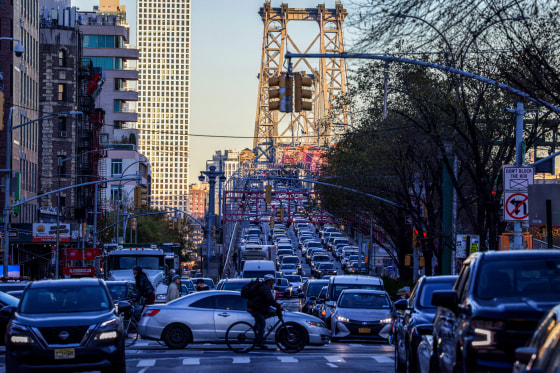
New York City’s first-in-the-nation Congestion Relief Zone officially opened on Sunday, imposing congestion charges of up to $9 on drivers entering Manhattan’s busiest districts.
According to the New York Metropolitan Transportation Authority, the zone “is fully operational” and opened at 12:01 a.m. on Sunday.
The plan intends to alleviate New York’s notorious traffic issues and generate funds for public transit. Despite last-minute efforts by neighboring New Jersey and local resistance, including from President-elect Donald Trump, it goes into effect.
Most cars entering Manhattan’s Central Business District, which runs from 60th Street to the southernmost point of the Financial District, are required to pay a peak tax of $9 between the hours of 5 a.m. and 9 p.m. on weekdays and 9 a.m. and 9 p.m. on weekends, according to the pricing plan.
A 75% discount of $2.25 would apply during off-peak hours.
During peak hours, entry into Manhattan costs $14.40 for small trucks and non-commuter buses and $21.60 for larger trucks and tourist buses.
Drivers will only be taxed once daily; low-income drivers, people with medical issues that prevent them from utilizing mass transit, and certain government and emergency vehicles are exempt. Additionally exempt are commuter and school buses.
After the toll starts, the MTA estimates that there will be 10% fewer cars and trucks. Additionally, MTA administrators have pledged that the region’s system will be modernized with billions of dollars earned through congestion pricing.
After two years of delays and changes due to complaints from commuters and companies who believe the fare is unfair, Governor Kathy Hochul sought to bring the program back.
The true race, however, was to approve the pricing before Trump’s January inauguration.
Republicans have already asked Trump to step in, and the New York native has vowed to abandon the proposal when he returns to the White House.
Despite a last-ditch effort by New Jersey to halt the operation on environmental grounds, the charges also started as planned. Tens of millions of dollars were awarded in the New Jersey complaint, which forecast environmental damage if traffic on the other side of the river worsened.
The MTA told NBC New York last week that it had the go-ahead to begin congestion pricing, even though the judge decided that the Federal Highway Administration (FHWA) would need to weigh in.
New York Governor Kathy Hochul has responded to the lawsuit from New Jersey by saying that she offered money to resolve it, but no agreement was reached.
Hochul earlier stated, “We have made several offers to settle this lawsuit, very generous offers.”
Although New York may have been the first American city to implement congestion pricing, Stockholm and London have long had comparable programs in place.
Note: Every piece of content is rigorously reviewed by our team of experienced writers and editors to ensure its accuracy. Our writers use credible sources and adhere to strict fact-checking protocols to verify all claims and data before publication. If an error is identified, we promptly correct it and strive for transparency in all updates, feel free to reach out to us via email. We appreciate your trust and support!
